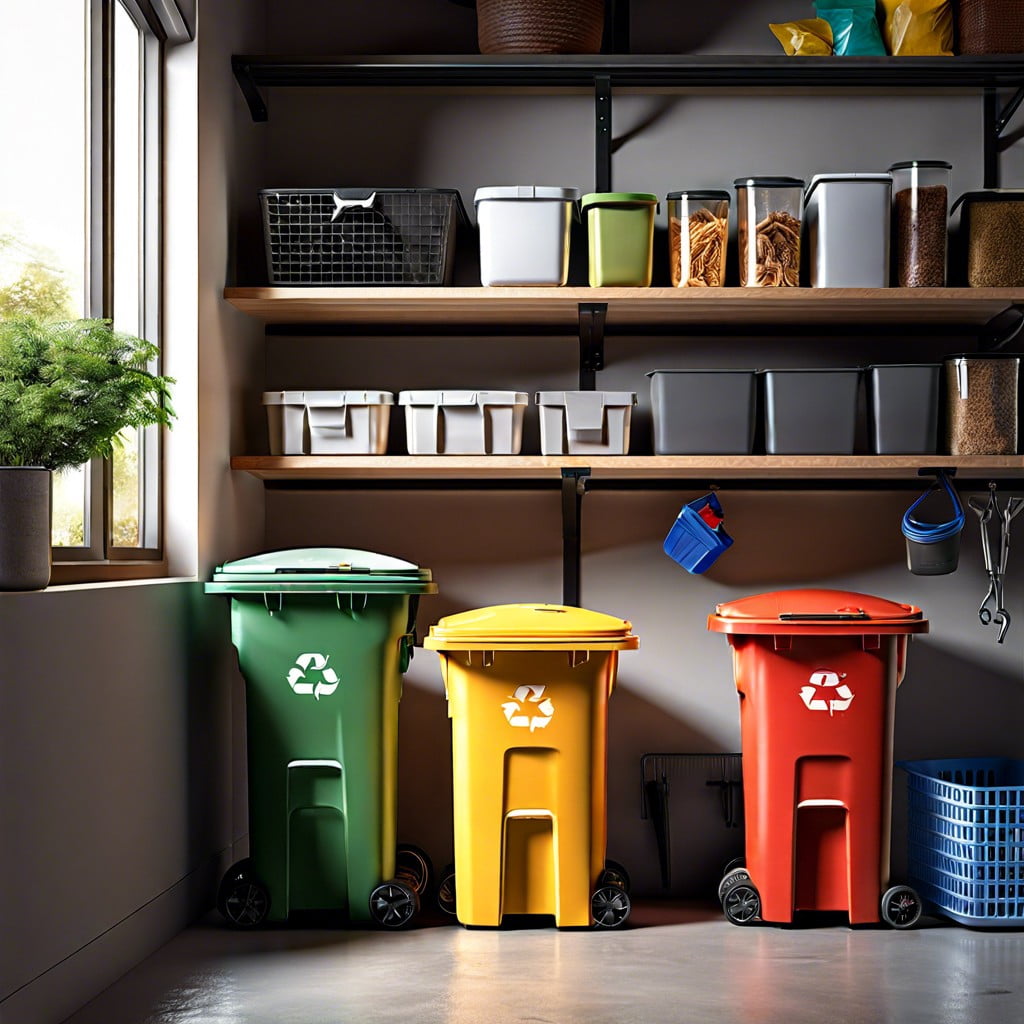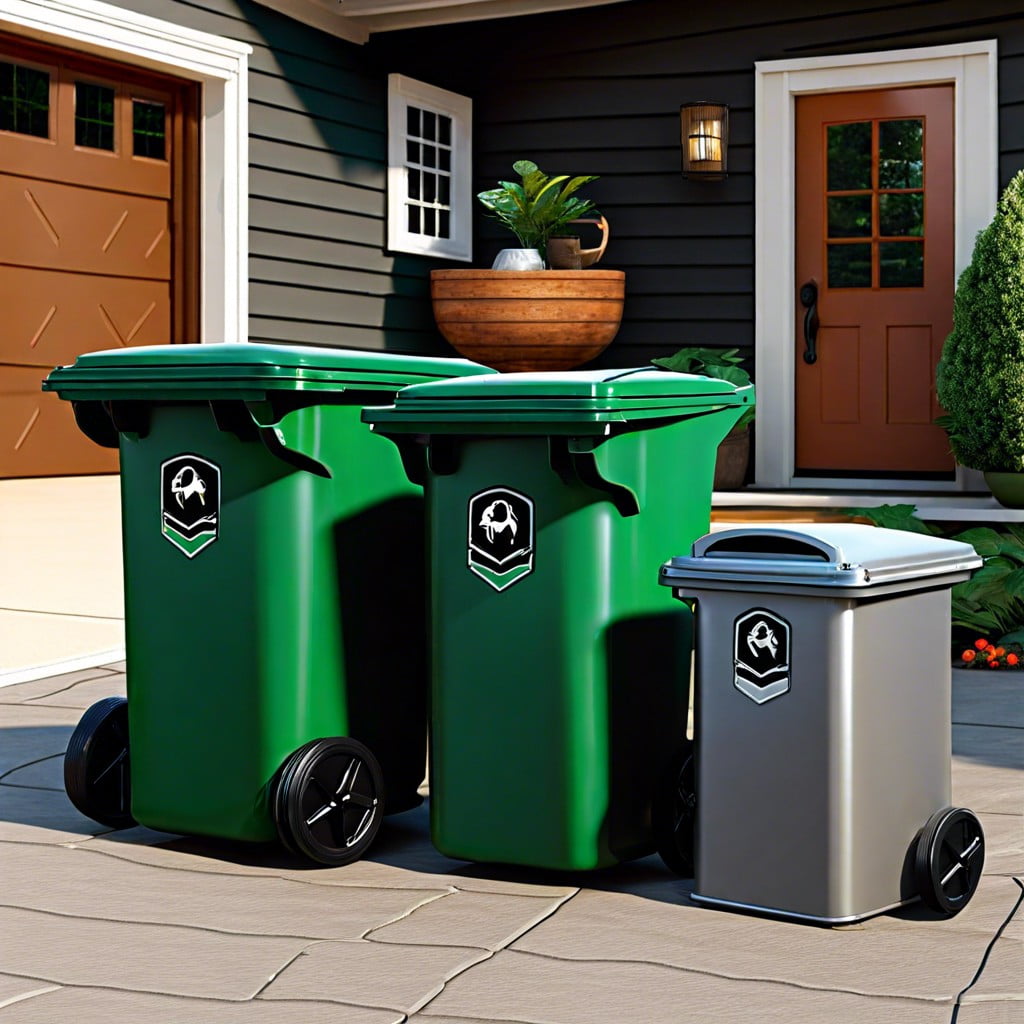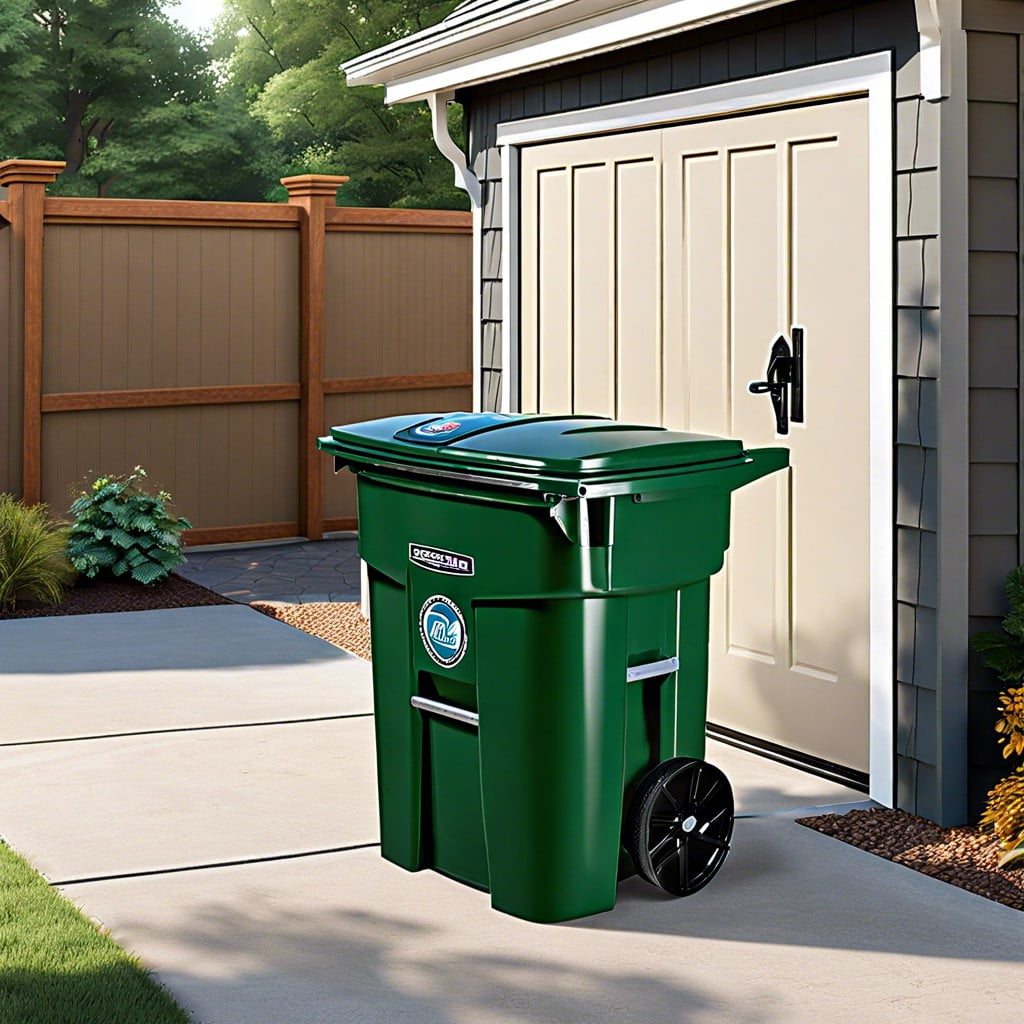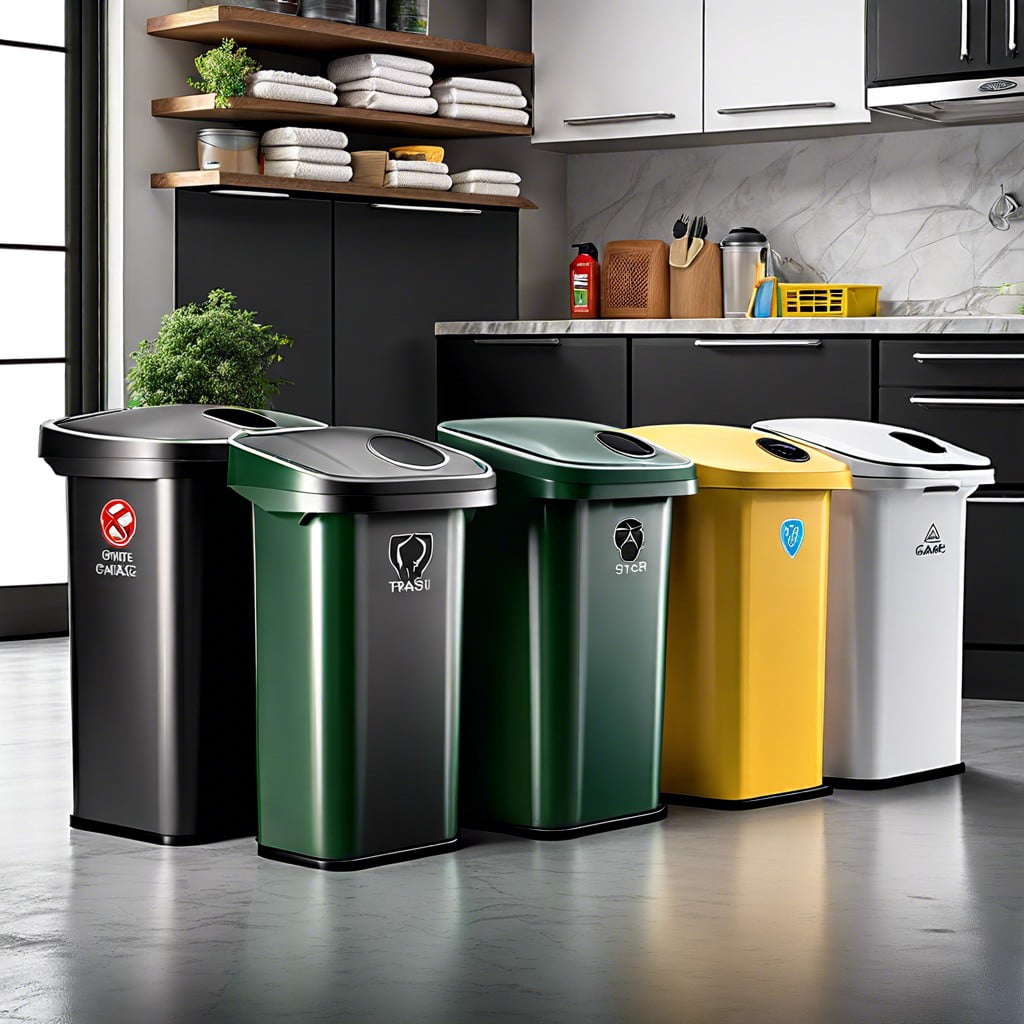Explore the beauty of a clutter-free garage with a properly selected garage trash can, because even the smallest details can transform your space significantly.
Key takeaways:
- Garage trash can maintains cleanliness and organization
- Choose the right size for your garage
- Consider material durability and maintenance
- Different lid types and odor control features to consider
- Innovative designs for space optimization
Importance of a Dedicated Garage Trash Can

Having a specific trash can for your garage helps to maintain cleanliness and organization within the space. It serves as a central spot to dispose of automotive products, gardening waste, and general debris that accumulates in a garage, differentiating it from household waste.
This separation ensures that recyclable items and hazardous materials can be dealt with appropriately, without contaminating domestic trash. Additionally, a trash can in the garage prevents the need to carry waste through the home, reducing the risk of spills and dirt transfer.
It streamlines waste management, keeping your garage in order and ready for your next project or activity.
Selecting the Right Size for Garage Trash Cans

Choosing an appropriately sized trash can is crucial for your garage. A can that’s too small requires frequent emptying, while an oversized one can become a cluttered storage spot for waste.
Begin by assessing your typical garage trash output. For general household waste, a can ranging from 20 to 32 gallons often suffices. However, if the garage doubles as a workspace, consider a larger can to accommodate scraps and larger debris.
It’s also important to factor in your physical space. A compact bin fits neatly into tight spots, whereas a bigger garage might better accommodate a larger can. Make sure to leave ample clearance for foot traffic and vehicle parking.
Lastly, think about your trash collection service’s requirements. Some services have size limitations or provide specific cans, which means purchasing an additional one may not be necessary. Regularly reviewing your needs ensures that your garage trash can remains a functional and efficient element of your waste management system.
Material Considerations for Durability and Maintenance

Selecting the proper material for your garage trash can is essential for both longevity and ease of maintenance. Heavy-duty plastics are a popular choice, offering resistance to denting and cracking. Many models feature seamless construction, which prevents leaks and simplifies cleaning.
For those who prefer metal, galvanized steel is a sturdy option that withstands rust and can bear the brunt of high-temperature swings common in garage environments. Stainless steel, albeit more expensive, presents a sleek look and is easy to wipe clean, though it may require more frequent maintenance to avoid fingerprints and smudges.
Bear in mind that the texture of the material also plays a role in maintenance. Smooth finishes tend to be easier to clean compared to rough or ridged surfaces that may trap dirt and debris. Whatever material you choose, consider its compatibility with the types of waste frequently disposed of in your garage and the cleaning solutions you prefer to use.
Lid Types and Odor Control Features

Optimal lid design is essential for containing smells and maintaining cleanliness. A tight-fitting lid helps seal in odors, keeping the garage environment fresh. Swing-top options offer ease of use but may not be as effective for odor control as sealed alternatives.
Step-on lids afford convenience, allowing for hands-free operation which is particularly useful when disposing of messy waste. This type also tends to provide a better seal against odors.
Sensor lids, which open automatically, reduce the need to touch the can, minimizing the spread of dirt and germs. However, they typically require power and may have a higher upfront cost.
Venting channels can be a valuable addition, making trash bag removal easier and preventing a vacuum that traps bags. This feature also circulates air inside the trash can, occasionally reducing the intensity of bad smells.
For garage trash cans that may contain food waste or other odor-generating refuse, look for models that include charcoal filters or other built-in odor-neutralizing technologies. They can significantly improve air quality and reduce the need for frequent emptying.
Remember, while lids are crucial for managing odors, regular cleaning and appropriate liner use are equally important for maintaining a fresh-smelling garage.
Options for Recycling and Hazardous Waste Separation
Incorporating separate bins for recyclables streamlines the process of responsible waste disposal. Clearly labeled containers ensure plastics, glass, and paper are not mixed with regular trash, facilitating efficient recycling.
For hazardous materials like batteries, paint, or chemicals, special disposal containers are essential. These should be sturdy, leak-proof, and appropriately labeled to prevent contamination and ensure they are handled correctly.
Consider installing a wall-mounted system to delineate areas for each type of waste, saving valuable floor space and keeping recyclables organized. To further support eco-friendly initiatives, opt for bins made from recycled materials.
Innovative Designs for Space Optimization
Stackable bins maximize vertical space, ideal for small garages. Wall-mounted systems free up floor area, often incorporating fold-out features for accessibility.
Some designs include integrated tool storage, which merges waste management with organization. Corner units take advantage of underutilized spaces, making them functional.
Retractable cans that slide out from cabinets or shelves keep trash out of sight while being easily accessible. Custom-fit solutions can be tailored to uniquely shaped garages, ensuring every inch is efficiently used.
Security Features to Prevent Pest Infestations
Ensuring your garage trash can is equipped with robust security features is key to preventing unwelcome pests.
A well-designed can should have a tight-fitting lid that seals shut, which not only contains waste but also blocks the enticing aromas that attract rodents and insects.
Some models provide locking mechanisms, an excellent deterrent against raccoons and other wildlife known for their dexterity.
For added assurance, opt for cans with heavier materials that can’t be easily knocked over.
To take it a step further, consider trash cans that feature smooth walls, offering no foothold for climbing pests.
Equipped with these defenses, your garage trash bin stands as a formidable barrier, keeping the critters at bay and maintaining your garage’s cleanliness and hygiene.
Seasonal Considerations for Garage Waste Management
As the seasons change, so do the conditions in your garage, affecting how you should manage waste. In warmer months, increased temperatures can lead to faster decomposition and smellier garbage, necessitating more frequent disposal to keep the garage fresh. Consider opting for garbage bags with odor-neutralizing properties to tackle this issue.
Conversely, colder weather could freeze your waste, making it less odorous but potentially adding weight, which could lead to heavier bags that are more challenging to handle.
Moreover, seasonal activities often generate different types of waste. For example, in autumn, leaf litter and yard debris might fill your trash can quickly. Ensure you’re equipped with sturdy bags that can handle sharp twigs and branches without tearing. During the holiday season, expect an influx of packaging materials – having a plan for the disposal of recyclables will keep your space organized and prevent overflow.
To enhance efficiency, think about rotating your trash can’s location within the garage. Position it closer to the door in wet seasons for quick access, and move it further away during dry periods to maximize floor space for other activities. Finally, stay mindful of local waste management schedules that often adjust for holidays or severe weather, ensuring your garage trash doesn’t linger any longer than necessary.
Environmental Impact and Eco-Friendly Choices
Opting for garage trash cans made from recycled materials reduces your carbon footprint. Manufacturers now often use post-consumer plastics or metals, which not only diverts waste from landfills but also requires less energy for production than new materials.
Biodegradable trash bags are another eco-conscious choice, breaking down more quickly in landfills and minimizing the impact of plastic waste. Look for bags certified by compostable standards to ensure they’ll decompose properly.
Consider a dedicated bin for collecting e-waste, such as batteries and old electronics, to prevent hazardous substances from contaminating soil and water. Many communities offer collection programs for such items, ensuring they’re disposed of responsibly.
Finally, implementing a garage compost bin for organic waste can significantly reduce landfill contributions. Compostable waste in landfills generates methane, a potent greenhouse gas, but when composted, it turns into nourishing soil, providing a double benefit for the environment.
Cost-Effective Solutions for Garage Trash Disposal
Identifying cost-effective solutions for garage trash disposal is essential for both budget-conscious homeowners and those seeking long-term value.
Bulk purchasing of garbage bags typically leads to savings, especially when chosen to match the size and shape of your trash can to avoid unnecessary waste.
Opt for a multi-stream trash can that separates recyclables; it can lower the cost of waste services where recycling is less expensive than trash disposal.
Consider investing in a durable, high-quality trash can that withstands frequent use and extreme temperatures often found in garages, as this can reduce the need for replacements over time.
Implementing a routine to reduce the waste generated in your garage, such as reusing or repurposing items, further contributes to cost-efficiency.
Moreover, local community programs may offer free or subsidized disposal for hazardous materials, so staying informed on such services is advisable.
FAQ
Is it OK to keep garbage can in garage?
Yes, it is acceptable to keep a garbage can in the garage, but potential odor issues may arise during warmer months.
How do I store trash in my garage?
Storing trash in your garage can be efficiently managed by using a 95- to 96-gallon trash bag to line your rollaway cans, thereby preserving the cans and preventing unpleasant odors.
How do I get a new garbage bin in Detroit?
To get a new garbage bin in Detroit, call Advanced Disposal Customer Care at (844) 2-DETROIT (233-8764) and request for a replacement or repair.
What is the best way to ventilate a garage to eliminate trash odor?
The best way to ventilate a garage to eliminate trash odor is to install effective exhaust fans and air vents, which will continuously circulate air and remove unpleasant odors.
Are there specific types of garbage cans ideal for garage storage?
Yes, stackable storage bins and heavy-duty, roll-out trash cans with lids are ideal for garage storage due to their space-saving and odor-sealing features, respectively.
How can one make a DIY trash bin holder for the garage?
One can make a DIY trash bin holder for the garage by assembling wooden planks into a box-like structure, reinforced with screws, with a front cut-out for easy access to the bin.